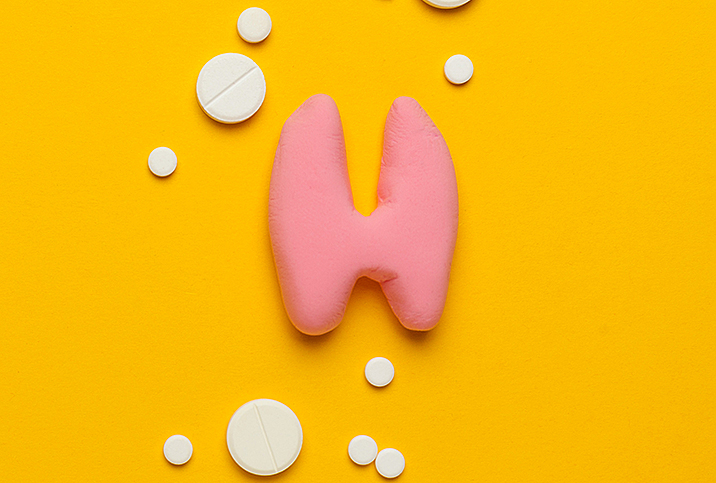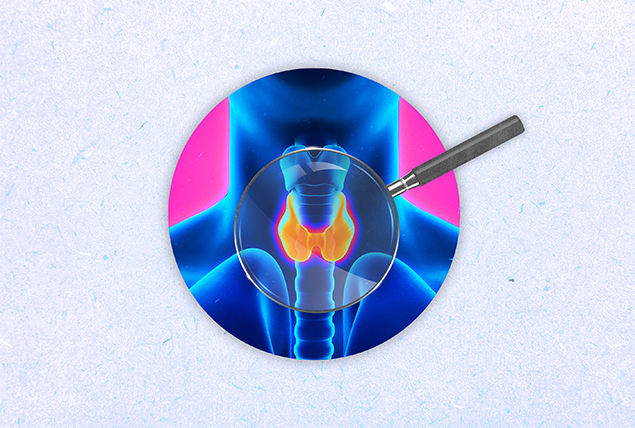An Insider's Look at Hypothyroidism

Thyroid problems result from thyroid hormone (TH) irregularities. When a thyroid is underactive, it is known as hypothyroidism.
Pathophysiology of the thyroid gland
The lepidopterous thyroid gland consists of two lobes connected by a thin string of tissue, or isthmus, at the base of your neck. It is governed by the pituitary gland, a gland responsible for releasing thyroid-stimulating hormone (TSH) at varying dosages depending on the TH level's need.
If your T-3 and T-4 counts are low, the pituitary gland will send extra TSH to balance them out, for example.
The thyroid is instrumental in virtually all bodily functions, as TH production fuels other cells. In the incidence of hypothyroidism, hormones drop to a precarious level due to lack of production or release.
When thyroid-dependent cells don't receive enough fuel, their activity comes to a halt, causing disruptions. These can include putting on weight, poor blood circulation and could affect your sexual function.
The causes of hypothyroidism
The most common conditions that can cause hypothyroidism include the following:
- Autoimmune disease. This happens when your immune system creates antibodies that attack tissue that's otherwise healthy. Most cases of hypothyroidism are caused by an autoimmune disease called Hashimoto’s thyroiditis, or Hashimoto's disease.
- Prescribed medicine. Lithium, which is used as a treatment for some psychiatric disorders, is an example of a medicine that can cause hypothyroidism.
- Radiation therapy. Treatment for cancers of the head or neck area could lead to hypothyroidism.
- Surgery of the thyroid gland. Any surgery that takes place on the thyroid can limit the gland’s ability to create thyroid hormones and thus promote hypothyroidism.
- Thyroiditis. This occurs when the thyroid gland becomes inflamed through infection, an autoimmune disorder or other thyroid issue. Thyroiditis causes the thyroid to release all of the hormones it has stored. Afterward, the gland becomes underactive.
Hypothyroidism can also be something that you’re born with, either because you never had one or it didn’t develop properly. The condition can also be caused by a lack of iodine, a pituitary disorder or pregnancy.
Women are more at risk of hypothyroidism. Other hypothyroid risk factors also include living a sedentary lifestyle and having a family history of disease of the thyroid gland.
Chronic or extreme stress can exacerbate hypothyroidism. Your thyroid gland works alongside your adrenal glands, the latter producing cortisol when you’re stressed.
There’s a delicate balance between stress hormones and cortisol that affects thyroid function and, while chronic stress alone won’t cause a thyroid disorder, it can make the condition worse.
The common signs and symptoms of hypothyroidism
Thyroid problems are notoriously hard to diagnose because their diversity of symptoms can be obscured by other ailments.
Dual board-certified dermatologist Alpana Mohta, M.D., DNB, based in Rajasthan, India, Sarah Tedjasukmana, MBBS, DCH, CBS, FRACGP, a specialist general practitioner in New South Wales, Australia, and Alyce Garth, a thyroid and autoimmune health and nutrition coach in Queensland, Australia (with hypothyroidism), mentioned the following symptoms:
- Bradycardia, where your heartbeat is slower than 60 beats per minute
- Constipation
- Dry or brittle hair, skin and nails
- Depression and anxiety
- Fatigue or lethargy
- Heavy menstruation
- Impaired circulation
- Infertility and sexual issues, such as sterility, menstrual irregularities or erectile dysfunction (ED)
- Memory issues
- Presence of goiter, or noticeably enlarged thyroid
- Reduced mood and cognition, such as depression and brain fog
- Sensitivity to cold
- Thinning hair
- Weakened and tender muscles, including muscle aches and stiffness
- Weight gain
It's unlikely any one person will experience all these symptoms. And any symptoms will present with varying severity depending on disease advancement.
Patients with congenital hypothyroidism—those who have experienced the condition from birth—don't show signs immediately. Treatment for infants is imperative to prevent serious physical and cognitive developmental disruptions.
Signs to look out for thyroid issues in infants include:
- Constipation
- Jaundice, a yellowing of the skin and whites of the eyes
- Low weight gain
- Poor growth
- Problems feeding
- Swollen tongue
- Umbilical hernia, or a bulge near the belling button
The onset of hypothyroidism beginning in children and teens displays similar developmental disruptions:
- Delayed mental development
- Delayed puberty
- Slow development of permanent teeth
They begin to experience similar symptoms to those found in adults.
Hypothyroidism mimics other age-related conditions, so older adults may have the condition, but the signs go undetected without testing.
Diagnosis and tests for hypothyroidism
When a thyroid disorder is suspected, there is a medical protocol in place to make or rule out a diagnosis.
"Recognizing hypothyroidism involves a combination of clinical presentation and laboratory testing," Mohta said. "Most commonly, lab results will show raised levels of TSH and reduced levels of thyroid hormones T-3 and T-4."
Tedjasukmana noted that those results imply the brain is trying to increase the hormone level.
"Sometimes the TSH level will be high but with still normal levels of thyroid hormone. We call this subclinical hypothyroidism," she said. "It tells us your body is having to work harder than usual to keep the levels normal."
In other cases, additional tests may be needed to find out the cause of irregularities.
Along with bloodwork, doctors will document a list of patients' symptoms and their family and medical history. Prior thyroid trauma, radiation therapy for head or neck cancer, and certain medications have been associated with thyroid disease.
Doctors will physically examine the neck to detect goiter, conjointly looking for other manifestations, such as dry skin, Garth said.
When to seek help and who to see
See your healthcare provider if you have any indicators of hypothyroidism. The first sign most people notice is their bodies seeming to slow down. Sometimes the disease remains hidden for years before symptoms are pronounced enough to gain notice.
An underactive thyroid can often be treated by a general or primary physician. Tedjasukmana said. However, the physician may recommend a referral to an endocrinologist for further treatment if the disease is advanced or has complex origins.
What happens if hypothyroidism goes undiagnosed?
Neglecting treatment for an underactive thyroid may have dire consequences. Existing symptoms such as asthenia, cognitive impairment (including brain fog and lack of concentration), depression and dermatological problems will progressively worsen, Garth said.
Other signs of an undiagnosed underactive thyroid include:
- Profound facial puffiness
- Infertility
- Numbness
- Intolerance to cold temperatures
Over time, Tedjasukmana said hypothyroidism can also contribute to osteoporosis, leading to complications stemming from significant weight gain, bringing about another list of further repercussions.
Garth and Mohta both emphasized the increased risk of cardiovascular disease, which can be a result of hypothyroidism itself, added strain on the heart from being overweight or a combination of both.
In severe cases, the condition can induce a coma, Mohta said. Myxedema coma is fairly uncommon unless hypothyroidism is unmanaged, but it is serious and could result in death if not treated promptly.
If you or someone you know is complaining of hypothermia, bradycardia, hypotension, respiratory difficulties, extensive swelling or impaired consciousness, seek immediate medical attention.
Treatment options, side effects and costs
Hypothyroidism treatment is determined by the stage of disease progression and the individual needs of the patient.
The first line of defense recommended by experts is TH replacement from medications such as thyroxine, prescribed by an endocrinologist, integrative medicine practitioner or general practitioner.
These medications often need to be taken indefinitely for continued normalized blood test results, though you may be able to wean off of them if your condition improves.
Pricewise, prescription thyroxine is relatively affordable with insurance, but costs rise with elevated dosages. Choosing generic over name-brand medication is one way to cut back on copays.
There have been some side effects reported from thyroxine, though they're rarely severe, according to the Mayo Clinic. These include: weight fluctuations, gastrointestinal upset, heat sensitivity, menstrual changes and hair loss.
Sexual dysfunction is another classic sign of hypothyroidism.
Men with erectile dysfunction have experienced symptom alleviation when medicated, but women often show no difference in outcome, regardless of prescription usage, suggested a 2020 report.
The symptoms of hypothyroidism can impact many other body systems and that can create varied economic burdens. Annual disease-related medical costs range from $460 to $2,555, according to a 2021 report.
Comorbidities—which are prominent with thyroid disorders—of psychiatric, reproductive, digestive, neurological or cardiovascular conditions significantly increase financial requirements.
Patients should factor in costs for in-office visits, lab work and any other tests or therapies.


















